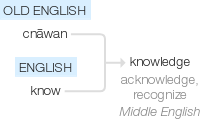Knowledge
Middle English (originally as a verb in the sense ‘acknowledge, recognize’, later as a noun): from an Old English compound based on cnāwan (see know).
wiktionary
From Middle English knowleche, knaweleche, cnawlece(“knowledge”), from knowen(“to know, recognise”) + -leche. Related to Middle English knowlechen(“to find out, acknowledge”). For more on the Middle English suffix -leche, compare freelage. Compare also Old English cnāwelǣċ, cnāwelǣċing(“acknowledging, acknowledgement”).
etymonline
knowledge (n.)
early 12c., cnawlece "acknowledgment of a superior, honor, worship;" for first element see know (v.). The second element is obscure, perhaps from Scandinavian and cognate with the -lock "action, process," found in wedlock.
From late 14c. as "capacity for knowing, understanding; familiarity;" also "fact or condition of knowing, awareness of a fact;" also "news, notice, information; learning; organized body of facts or teachings." Sense of "sexual intercourse" is from c. 1400. Middle English also had a verb form, knoulechen "acknowledge" (c. 1200), later "find out about; recognize," and "to have sexual intercourse with" (c. 1300); compare acknowledge.
